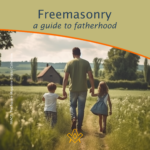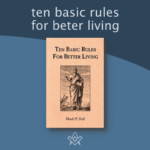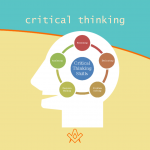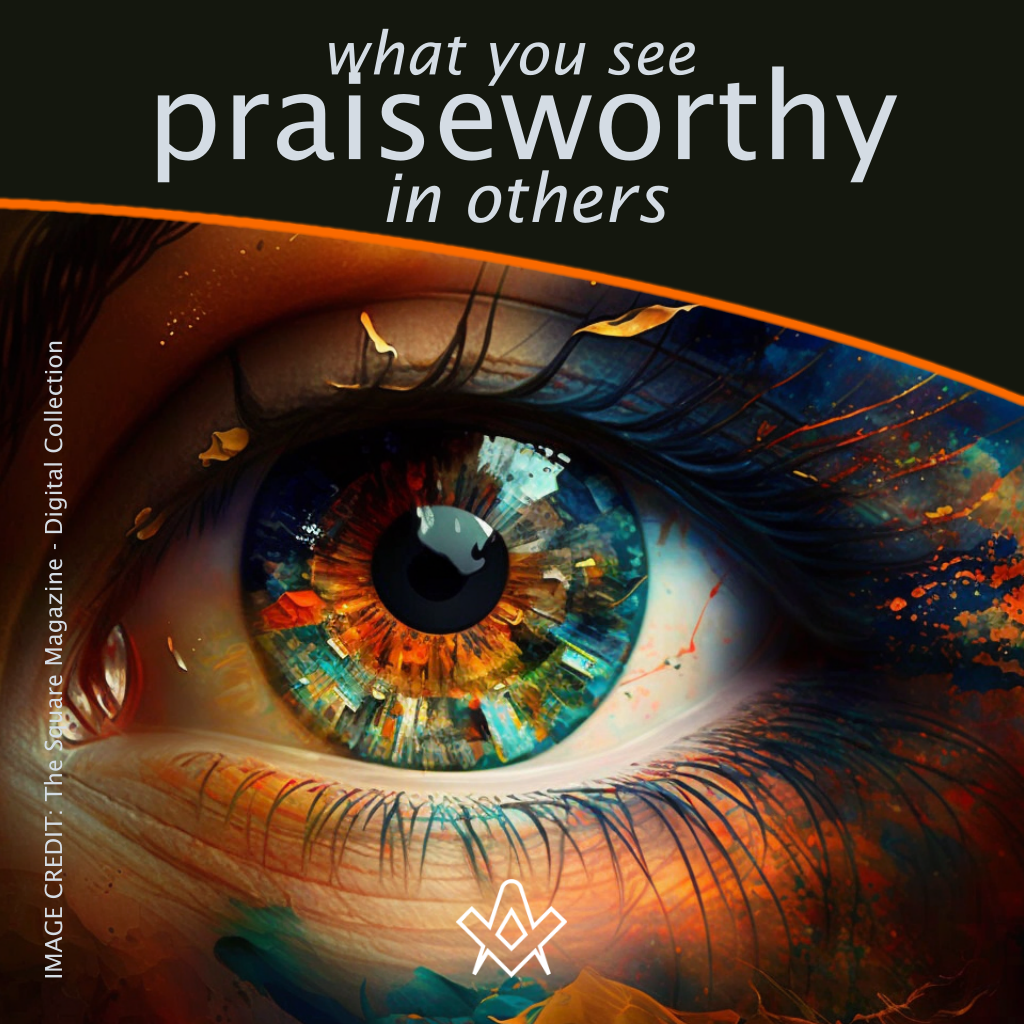What you see praiseworthy in others, carefully imitate, and what in them may appear defective, you will in yourself amend.
This passage of Masonic ritual (from Taylors Working, Address to the Wardens) is advice on how to improve oneself by observing others.
It suggests that we should pay attention to the admirable qualities that we see in others, and try to incorporate them into our own lives.
At the same time, we should also notice the faults or shortcomings we see in others and work to avoid those in ourselves.
Have you ever looked at someone and thought, “I wish I had their confidence?” Or, seen someone perform an act of kindness and wished you could be more like them?
The truth is, we can all learn from others, and in doing so, improve ourselves. The quote “what you see praiseworthy in others, carefully imitate, and what in them may appear defective, you will in yourself amend” is a powerful reminder of the transformative power of observation and emulation.
The Art of Self-Improvement
Self-improvement is an ongoing process, and it requires a combination of self-reflection and observation. In other words, we need to be aware of our own strengths and weaknesses, and also look to others for inspiration and guidance.
This is where the quote “what you see praiseworthy in others, carefully imitate” comes into play. When we see someone who possesses qualities that we admire, we can take note of those qualities and try to incorporate them into our own lives.
For example, if you have a co-worker who is always positive and upbeat, you might try to adopt a similar attitude.
Or, if you know someone who is a great listener, you might try to improve your own listening skills.
The key is to be intentional about the qualities you want to emulate and to make a conscious effort to practice them in your own life.
Avoiding Faults and Shortcomings
At the same time, it’s important to be mindful of the behaviours and qualities that we don’t want to emulate.
This is where the second part of the quote comes in: “and what in them may appear defective, you will in yourself amend.”
When we see someone exhibit behaviour that we don’t want to replicate, we can use it as an opportunity to reflect on our own behaviour and make changes.
For example, if you know someone who is always gossiping about others, you might make a conscious effort to avoid engaging in similar behaviour.
Or, if you see someone who is always procrastinating, you might try to be more proactive and disciplined in your own work.
Again, the key is to be intentional and make a conscious effort to improve.
Learning from Mistakes
In addition to learning from the behaviour of others, we can also learn from our own mistakes. No one is perfect, and we all make mistakes from time to time.
However, the true measure of success is how we respond to those mistakes. When we make a mistake, we can choose to wallow in self-pity and beat ourselves up, or we can use it as an opportunity to learn and grow.
If we adopt the mindset that every mistake is an opportunity to learn, then we can view our mistakes as stepping stones to success.
When we make a mistake, we can take note of what went wrong, and make a conscious effort to avoid making the same mistake in the future.
By doing so, we can turn a negative experience into a positive one, and use it to improve ourselves.
The Power of Positive Thinking
Another key to self-improvement is adopting a positive mindset. When we focus on the positive aspects of ourselves and others, we can achieve great things.
This doesn’t mean that we ignore our faults or shortcomings, but rather, that we choose to focus on our strengths and the strengths of those around us.
When we have a positive mindset, we are more likely to take risks, try new things, and persevere in the face of adversity.
We are also more likely to see the good in others, which can lead to stronger relationships and a more positive outlook on life.
Conclusion
In conclusion, the quote “what you see praiseworthy in others, carefully imitate, and what in them may appear defective, you will in yourself amend” is a powerful reminder of the transformative power of observation and emulation.
By looking to others for inspiration and guidance, we can improve ourselves and become better individuals.
Self-improvement requires a combination of self-reflection and observation.
We need to be aware of our own strengths and weaknesses, and also look to others for inspiration and guidance.
When we see someone who possesses qualities that we admire, we can take note of those qualities and try to incorporate them into our own lives.
And when we see someone exhibit behaviour that we don’t want to replicate, we can use it as an opportunity to reflect on our own behaviour and make changes.
Recent Articles: skill series
 Freemasonry and Reskilling in the age of AI The article explores the challenges and strategies organizations face in reskilling their workforce in the era of automation and artificial intelligence. It highlights the need for companies to view reskilling as a strategic imperative and involve leaders and managers in the process. The article also emphasizes the importance of change management, designing programs from the employee's perspective, and partnering with external entities. |
 Ten Central Commandments or Principles of Freemasonry Embrace the wisdom of Freemasonry's teachings in your personal journey towards self-improvement and stronger leadership. By upholding virtues of integrity, compassion, and respect, and uniting these with a commitment to continuous learning and social responsibility, inspire change. Transform yourself and the world around you, fostering a legacy of positivity and enlightenment. |
 Freemasonry: A Guide to Fatherhood In the sacred halls of Freemasonry, fathers discover a hidden power to transform their parenting journey. With its timeless values, supportive community, and life-enriching teachings, Freemasonry empowers fathers to provide a moral compass, foster self-improvement, build stronger connections, and embrace the confidence and wisdom needed to navigate the complex realm of fatherhood. |
 Courage as a core value in Freemasonry Freemasonry, a revered fraternity, prioritizes virtues like honesty and charity. However, courage is foundational. From Plato to Maya Angelou, courage is vital for other virtues. Freemasonry's teachings, referencing events like Gettysburg, emphasize diverse courage forms. In today's divided world, Masons promote and exemplify courage, understanding its importance in facing challenges. |
 How Freemasonry Cultivates Ideal Entrepreneurial Traits Freemasonry's cryptic rituals hold timeless lessons for building entrepreneurial greatness. Through tests of passion, vision and skill, Masonic teachings forge ideal traits like grit, creativity and alliance-making needed to seize opportunity and elevate enterprises. The right commitment unlocks code for entrepreneurial success. |
 What you see praiseworthy in others "What you see praiseworthy in others, carefully imitate, and what in them may appear defective, you will in yourself amend". This passage of Masonic ritual (Taylors Working, Address to the w |
 How to Learn Ritual with a Learning Disorder So what do you do when faced with that little blue book? Most Masons when first looking at the ritual book can understandably be fazed – the tiny print, the missing words, the questions and answers! Learning ritual can be a challenging task for anyone, especially individuals with learning disorders, but it is not impossible. Here are some tips to help make the process easier. |
 A "mind palace", also known as a "memory palace", is a technique for memorizing and recalling information. How would your life change if you could remember anything and everything? Discover the 'Mind Palace' and all will be revealed. |
 What is leadership and who does freemasonry help develop those skills needed to be a better leader |
 A story of the 'Ruffians' – those individuals whose paths cross ours, who feel entitled to seize and consume the property of others that they have not earned. A lesson to build character to be a better citizen of the world. |
 Now we are back in the Lodge room once again, maybe it is time to review how we learn and deliver ritual and look at different ways of improving that process. |
 Making an advancement in Masonic Knowledge can become far easier when you 'learn how to learn'. |
 Learn how to practise Masonic meditation in a busy world with all its care and employments |
 Struggling to learn your ritual? Become a 5-Minute Ritualist with the aid of a book of the same name. |
 Day in the life of a Freemason As we start a new year, maybe start it with a new habit? |
 Ten Basic Rules For Better Living Ten Basic Rules For Better Living by Manly P Hall |
 How can we use masonic leadership skills to avoid confrontational situations? |
 How the Trivium is applied to Critical Thinking - {who, what, where, when} - {how} - {why} |
 The Seven Liberal Arts - why 'seven', why 'liberal', why 'arts'? |
 How to improve your public speaking skill with 6 techniques |
 Do you need to speak in public, or present Masonic ritual without notes ? |
 What are logical Fallacies and how to spot them |
 Share one easy tip to learn masonic ritual; Some good tips from Facebook followers |
 How can we use the 7 secrets of the greatest speakers in history |
 What is a critical thinker and what are their characteristics? |
 Share one personal skill Freemasonry helped you to improve? How can we make practical use of the lessons taught in Masonic writings? |
 An introduction to the art of public speaking - speak with confidence |
 Seven Liberal Arts and Sciences What do you know about Seven Liberal Arts and Sciences |
 Three Words That Will Change Your Life This article discuss a common situation found in many lodges - a difficulty in holding a conversation with a stranger. |
 Al - Khwarizmi live c750 - c820 is credited as being the father of Algebra, being asked what is Man, give his answer in an algebraic expression |
masonic knowledge
to be a better citizen of the world
share the square with two brothers

click image to open email app on mobile device







